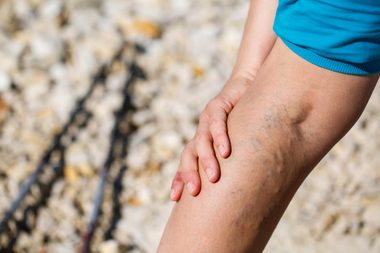
Varicose veins are hereditary
Sorry about this, but if your parents or grandparents have varicose veins, there’s a good chance you will develop them too. “The primary factor contributing to the development of varicose veins is heredity or the genetic predisposition to weak vein walls and vein valves resulting in leg vein problems,” shares Luis Navarro, MD, FACS, and founder and director of The Vein Treatment Center in New York City. Learn the 9 parts of your body that reveal your age first.
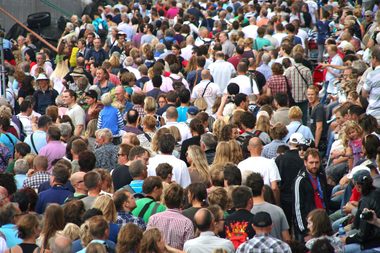
Nearly half the population suffer from varicose veins
Maybe it’s not the topic of discussion over brunch, but a lot of women suffer from varicose veins, and some may not even know it. More than 50 percent of women and 40 percent of men have some forms of varicose veins, reports the Office on Women’s Health.
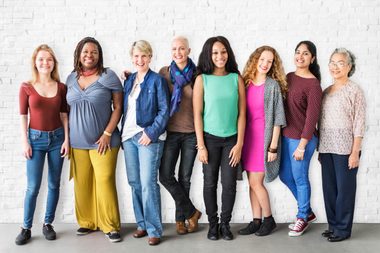
Women are 20 times more likely to have them than men
Sorry, ladies, but according to Dr. Navarro, women are much more likely to develop varicose veins than men, like 20 times more likely. Don’t miss these other 15 signs your body is aging faster than you are.
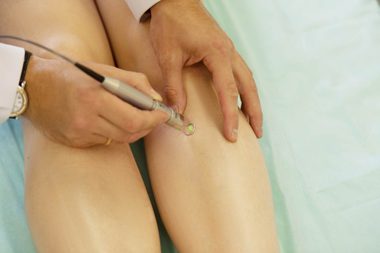
Varicose veins cannot be cured at home
Don’t believe the hype that a cream or massage can cure varicose veins. “Varicose veins cannot be cured with any at-home remedies or treatments,” Dr. Navarro advises. “The only way to get rid of varicose veins is with professional treatments.”
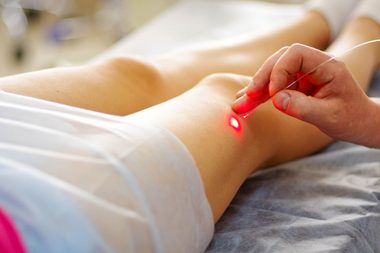
Early medical treatment is recommended
And the earlier the treatment, the better. “It is important to seek medical treatment early in order to stop the natural progression of this disease, reduce symptoms, and to achieve the best possible cosmetic results,” says Dr. Navarro. Besides, if the symptoms are painful, you’ll naturally want to seek a cure as soon as possible. You can consult your dermatologist, a vascular medical doctor, or a phlebologist or ask your primary care doctor for a referral.
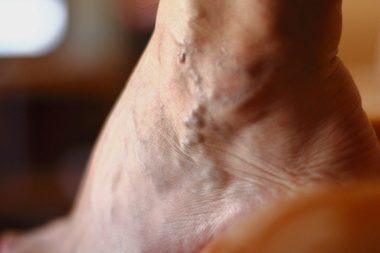
Varicose veins can be painful
Unfortunately, varicose veins are not always just a cosmetic concern. They can be extremely painful. “Varicose vein symptoms include swelling, heaviness, throbbing, cramping, and achiness,” says Dr. Navarro. Ouch. Plus, if they go untreated, you may have to worry about developing more serious issues such as ulcers and bleeding. Find out which times you should take your leg pain seriously.
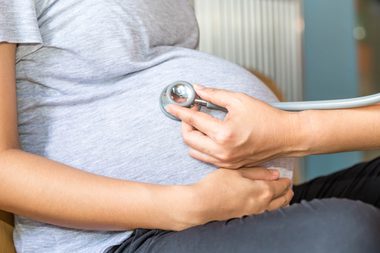
Hormonal factors can make varicose veins worse
One of the reasons women are more likely to develop varicose veins? Try hormones. This includes the use of birth control pills, hormone replacement therapy, and pregnancy. Pregnancy actually presents challenge to your veins on several fronts; in addition to the increase in hormones, your blood volume increases as does your weight, all of which increases the stress on your veins. So add varicose veins to the list of pregnancy woes along with stretch marks and saggy skin.
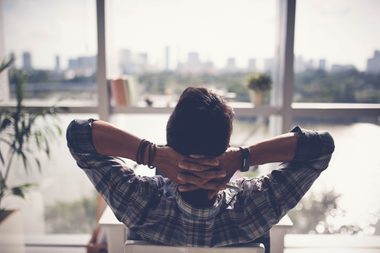
Lifestyle affects varicose veins
If you needed another reason to keep a healthy lifestyle, add varicose veins to the list. “Lifestyle choices can worsen varicose veins,” says Dr. Navarro, “These include lack of exercise and obesity, and sitting/standing for long periods of time repeatedly.” Here are other habits to start today that your 80-year old self will thank you for.
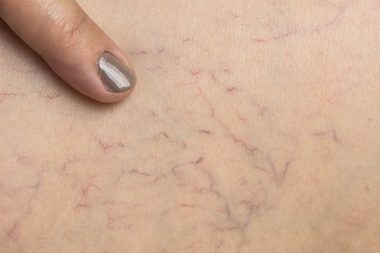
Varicose veins are caused by weak vein valves
It’s not the veins that are the issue with varicose veins, but the vein valves. “Varicose veins occur when weak vein valves are unable to prevent blood from flowing in the wrong direction (reflux), so the blood leaks back down the legs and pools in the leg veins,” shares Dr. Navarro.
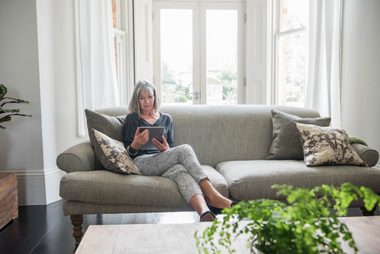
Crossing your legs is not a cause of varicose veins
This popular myth of crossing your legs leading to varicose veins? False. According to webmd.com, contrary to popular belief, leg crossing absolutely does not cause varicose veins, but it can exacerbate it, if you already have the condition. But there are some reasons to uncross those legs.
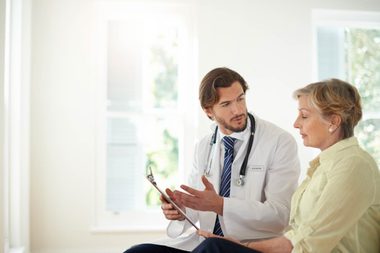
There are multiple varicose vein treatments
Depending on the severity, there are several options for treatment. “For small varicose veins, painless sclerotherapy or ‘injection therapy’ is used,” shares Dr. Navarro, “This involves a mild chemical solution that is injected into the incompetent vein or capillary causing it to collapse.” It’s a 30-minute treatment with no downtime. For larger varicose vein treatment, Dr. Navarro and other doctors offer Endovenous Laser Ablation (EVLA), also referred to as Endolaser, EVLT. It is an endovenous laser treatment preformed that is also minimally invasive. “It uses existing laser and ultrasound technology to close the main vein from the inside with laser energy,” says Dr. Navarro, “This is an in-office, half-hour treatment done under local anesthesia with no downtime.” More good news: Your insurance will likely cover the procedure if your veins are determined to be a health concern.
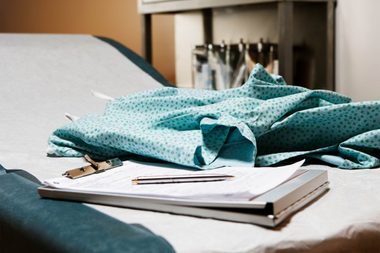
Your varicose veins might return
While it is possible to successfully treat existing varicose veins, there’s no way to cure the underlying problem of leaky valves. Add in that aging increases your likelihood of having varicose veins—and estimated 50 percent of Americans over the age of 50 have them—and follow-up treatments may be a distinct possibility. To reduce your risk of recurrence, maintain a healthy weight, exercise regularly, and, if possible, try to avoid sitting or standing for long periods of time. If broken capillaries are your main concern, try these 10 ways to erase and prevent spider veins.